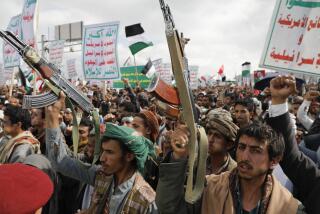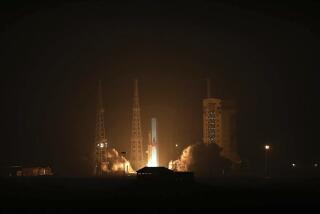Iraqi Missiles in Kuwait Raise Chemical Fears
- Share via
SAUDI ARABIA — Iraq has moved into Kuwait an unknown number of surface-to-surface missiles that are believed capable of delivering chemical warheads, a senior Saudi military official said Tuesday.
Prince Turki ibn Nasser, commander of a Saudi military base, said the missiles, which have a range of about 300 miles, began arriving in Kuwait the week after Iraq invaded the tiny Persian Gulf emirate Aug. 2.
Other Saudi and U.S. military officials said the missiles are believed to be either Soviet-made Scud or a similar, longer-range version of the Scud known as the Hussein. In either case, targets in Saudi Arabia would be within range, they said.
“They are capable of delivering high explosives,” Prince Turki told reporters. “There is talk of them being capable of carrying chemical warfare weapons.”
Meanwhile, Saudi military officials said pilots on both sides of the Saudi-Kuwaiti border have been engaged in almost daily “cat-and-mouse” border sorties, edging up to within 30 miles of the border before withdrawing.
“There is always this cat-and-mouse-type thing on the border,” the prince said. “We see them, we lock on (with radar) and they turn and go. I think they’re afraid of the capabilities of our aircraft. . . . With the capabilities of the aircraft we fly, we don’t need to be really close.”
He said Saudi officials are confident that the forces assembled in the Saudi desert over the last two weeks, vulnerable at first because of their small numbers, are now capable of halting an Iraqi assault on Saudi Arabia and of “kicking them back up north.”
But he expressed doubt that the Saudi, U.S. and other troops that make up the multinational force have the capability of carrying out a surgical strike in Iraq to help free the foreigners detained there.
“Until now, I don’t think anybody knows where they are,” the prince said. “You have to have an exact location to do that sort of thing.”
With Iraqi President Saddam Hussein’s deployment of the missiles in Kuwait, he said, “I think he has the ability and he has the means of delivering chemical weapons. . . . You expect anything from this guy.”
He said Saudi officials have not been able to determine the precise number of missiles deployed in Kuwait, but another officer, who asked not to be identified, said in an interview that their information is nearly exact.
“We have a good understanding of their locations and their numbers, and we keep an eye on them,” he said. “We are confident we can deal with them.”
In London, the publisher of Jane’s Defense Weekly said Iraq had moved 36 Scud launchers into Kuwait over the weekend, and some military experts estimated the number of missiles already in Kuwait at up to 800.
Heino Kopietz, a London-based Middle East military specialist, also said it appears likely that Iraq has deployed Scud missiles in Kuwait. He said he would not be surprised if Iraq were to deploy a weapon it used frequently in its eight-year war with Iran.
“It makes absolute sense,” he said. “It shows they are strengthening their forward defense and they are willing to retaliate.”
The Scud is also deployed by Soviet forces in Eastern Europe. Military experts say it can be useful against large-area targets but is not very precise and would not be effective against small targets.
Prince Turki said he believes that the Saudi and U.S. forces would be able to counter the Scud with the Patriot surface-to-air missile system, which is capable of intercepting missiles as well as aircraft. The Patriot has not been tested against the Scud, he said, but “it’s quite good in theory and tests.”
Recent Saudi intelligence reports show that the Iraqis have deployed tanks and surface-to-air missiles near the Saudi-Kuwaiti border at Khafji and are massing troops and equipment along Kuwaiti beaches as if expecting a landing there.
Officials are uncertain where Iraq will put a large number of troops being pulled back from its border with Iran.
“He’s now rearranging his Iraqi front, but we really don’t know what he’s going to do with those forces,” Prince Turki said. “Is he going to take them north or south? We really don’t know.”
Young Saudi men were reported lining up Monday at recruiting stations in response to King Fahd’s appeal Sunday for volunteers to “defend the nation and protect its Islamic shrine from any aggression.” The king ordered the opening of recruiting and training centers throughout the kingdom. The Saudi army’s present strength is 84,000 troops.
The Arab world’s first astronaut, Lt. Col. Sultan ibn Salman, an F-15 fighter pilot in the Saudi air force, said in an interview Sunday that the Saudi air force would dominate the Iraqis.
“I have no question in my mind that we are absolutely guaranteed to win,” he said.
But most pilots hope it won’t come to war, he said, adding, “I would hope first of all that no shooting war would break out, because the whole thing is crazy, and it’s escalated to a point that’s unbelievable.”
More to Read
Sign up for Essential California
The most important California stories and recommendations in your inbox every morning.
You may occasionally receive promotional content from the Los Angeles Times.










